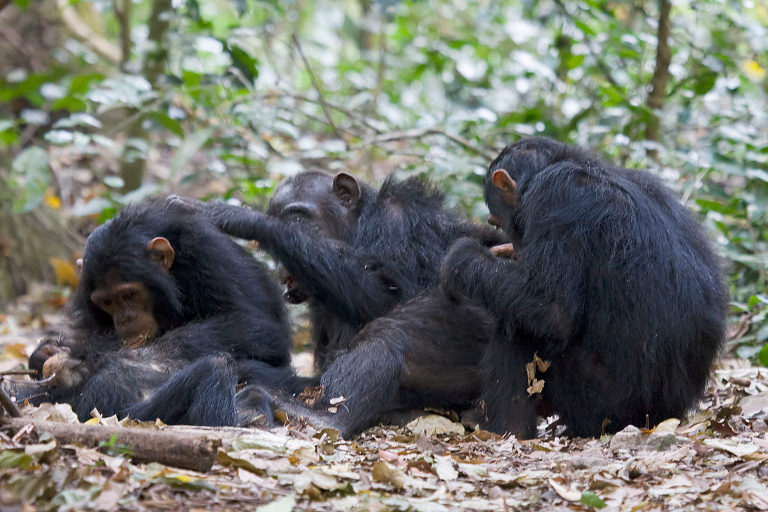Once upon a time, there was a revolution. I have never read about it in any history book, yet it was the ancestor of all revolutions, from the earliest slave revolts to the French and Russian revolutions, the gay rights movement and the #Metoo movement.
By not knowing about it, and not understanding its consequences, our interpretation of history is missing a critical dimension as we struggle to free ourselves from the tentacles of neoliberalism and build a new economy that is friendly to humans and nature, not just to bankers and greed. In the light of this revolution, our understanding of thinkers such as Machiavelli, Hobbes, Locke, Rousseau, John Stuart Mill, Marx, Owen, Kropotkin, Nietzsche, Polanyi, Keynes, Hayek, Rand and Ostrom is changed.
We may never know when it happened, but a quarter million years ago is a good possibility. To understand its origins, however, we have to go back six million years, to when we shared a common ancestor with the chimpanzees and bonobos. Even today, we share 99% of our genes, and the same impulses to mother, to play, to help each other, to use social skills, to hunt together, to form tribes, to fight, to bully and to dominate.
Through it all, the non-alphas resented being dominated
Our common ancestor lived in a hierarchical world dominated by the toughest alpha-males who demanded submission, got their pick of the females, attempted to stop other males from mating, and led the defense when another band attacked. Through it all, however, the non-alphas resented being dominated, so much so that on occasion they would conspire together to kill an alpha-male who everyone disliked.
As soon as our ancestors developed language and discovered how to make spears, however, the alpha-males lost their advantage: the sub-dominants rose up and overthrew them. This was the first revolution, the ancestor of all subsequent revolutions.
How many times this happened we may never know, but we do know that our hunter-gatherer ancestors were firmly egalitarian, constantly keeping watch against the rise of a new alpha-male. Using humour, gossip, ostracism, banishment, and when needed group murder, they declared in effect, “Never Again.” With every male and female now able to mate, the genes for reciprocal non-kin cooperation were passed down, thanks to the success of group selection.
“When a young man kills much meat he comes to think of himself as a chief or a big man, and he thinks of the rest of us as his servants or inferiors. We can’t accept this."
And yet the alpha-male impulse never went away: the hunter-gatherers were always on the lookout for a counter-revolution. When the anthropologist Richard Lee lived among the Ju’hoansi bushmen in the Kalahari in the 1960s a hunter told him that, “When a young man kills much meat he comes to think of himself as a chief or a big man, and he thinks of the rest of us as his servants or inferiors. We can’t accept this. We refuse one who boasts, for someday his pride will make him kill somebody. So we always speak of his meat as worthless. This way we cool his heart and make him gentle.”
For a quarter of a million years, this is how our ancestors lived. The habits of cooperation and fair play were firmly learnt and passed on, both culturally and genetically.
The alpha-male impulse regained its dominance
When the wild game became scarce, however, the hunter-gatherers started to harvest grains, slowly developing the skills of agriculture. With agriculture came grain storage, private ownership, village settlements, and larger groups less amenable to control by gossip and reputation, and somewhere along the way the counter-revolution happened. The alpha-male impulse regained its dominance, and ever since that time we have lived with warlords, kings, cronies, priests, social classes, debts, bonded labourers, poverty and slaves.
Our history would be simple if we could classify it neatly into dominating alpha-males versus cooperative hunter-gatherers, but the experience of agency gives us not one but two fundamental impulses. As well as the desire not to be dominated it gives us the impulse to explore our individuality – to wonder, to think for ourselves, to fly, and from this have sprung great civilizations, the Renaissance, the Enlightenment, science, the industrial revolution, and our recently discovered compassion for nature.
Our lives therefore reflect a three-fold tension between the alpha-male – and female – desire to dominate; the hunter-gatherer desire to cooperate; and the individual desire to fly.
Much to the regret of the rulers, the hunter-gatherer love of fair play and cooperation has never gone away.
Wherever tribes have embraced agriculture, dominance, hierarchy and prestige have returned to rule the roost. Much to the regret of the rulers, however, the hunter-gatherer love of fair play and cooperation has never gone away. In Europe they were persistently challenged by slave revolts, peasants’ revolts, the anti-papal reformation, commoners’ uprisings, and full-blooded national revolutions. Invariably, the call was for greater freedom, an end to oppression and justice for all – the age-old hunter-gatherer beliefs. And equally invariably, the alpha-males used brute force to try to defeat their challengers, just as the chimpanzee alpha-males muscled their way to dominance.
As the industrial revolution unfolded, our aspirational resistance to oppression and exploitation found expression first in the labour and cooperative movements and later in the anarchist, socialist and communist movements, resulting in many gains without which industrial capitalism would probably have collapsed – for as Keynes taught us well, when aggregate demand is weak an economy cannot flourish.
By not understanding this ancient historical tension, time and again our revolts and revolutions blundered through a failure to recognize that the same alpha-male impulses existed among the rebels. Thus our bright-eyed revolts and revolutions have given us Robespierre, Stalin, revolutionary males who wanted the women to run the bake-sales, male communards who used their belief in liberation to justify a free fuck, and freedom-fighting parents who still sought to dominate their children.
The impulse to dominate lurks within all of us
For the impulse to dominate lurks within all of us, as any two-year-old can show. And once out of its culturally controlled box men have used it to dominate women, parents to dominate children, white people to dominate blacks, straight people to dominate gays, and all humans to dominate animals and nature.
Thus the hunter-gatherer quest for freedom has needed to find its voice also in the suffragette and feminist movements, and now the #MeToo movement, challenging the men who assume that it’s okay to grab a woman by the pussy and to unzip their pants and pull out their penises – which is exactly how a chimp signals his readiness to mate.
By understanding all this, and reframing our struggles as being between the alpha-male impulse to dominate, the hunter-gatherer impulse to resist domination, and the individual desire to fly, we can extract a source of deep hope.
For just because the alpha-male impulse has dominated the world for several thousand years does not mean that it must continue to do so. Our hunter-gatherer ancestors ended millions of years of alpha-male oppression, and sustained their egalitarian cultures for maybe 250,000 years. There is every reason to believe that we can do so again.
But here’s the thing: dominating by force requires little skill. All you need is a fiery temper, some thugs, some submissive followers, an army, and compliant bankers.
Sustaining a culture of fairness and cooperation requires skill
Sustaining a culture of fairness and cooperation, by contrast, requires skill. Among the hunter-gatherers, in small groups of up to fifty people it required constant social observation, gossip, and various means of regulation, including assassination. Among people who share the commons in agricultural societies, the economist Elinor Ostrom has shown that it requires the cultural embrace of eight specific practices including clear boundaries, participatory decision-making, monitoring, graduated sanctions, and an agreed means of conflict resolution.
In modern post-aristocratic regimes it requires all the skills of healthy democracy, the rule of law, a free press, free speech, and constant vigilance. Without these, democracy degrades into plutocracy.
And then we come to our current challenge: how to turn alpha-male global capitalism into a new cooperative economy where businesses, bankers, traders and global financial übercrats participate in a culture of fairness and justice, including thriving community economies and a thriving and respected Nature’s economy.
In Scandinavia, the workers movements of the 1920s and ‘30s overthrew their land-owning rulers and replaced them with social democracy, seemingly without allowing new alphas to arise. In the 1990s, when in a sudden splurge of neoliberalism they chose to deregulate the banks, disaster soon followed and the decisions were quickly reversed.
The dream of full state socialism died because its leaders failed to understand either the potency of the alpha-male impulse to dominate or the urgency of the individual desire to be free. The current economic alpha-males are ideologically armed with neoclassical nonsense that presents a convenient rationale for shareholder gain, and they love to mock the failure of socialism while pushing the financial disaster of 2008 under their plush office carpets.
Meanwhile, the need for fairness, respect and cooperation is manifesting itself in a blossoming of new economic initiatives including workers cooperatives, values-based banks, social enterprises, urban farms, participatory politics, sharing economies, socially responsible investments, housing cooperatives, non-profits, social purpose businesses, employee-owned businesses, community currencies, solidarity economies, social care cooperatives, democratic reform initiatives, and a host of campaigns for social economic and political justice, fair trade, climate action, environmental protection, the end of tax evasion, and so on.
A new long era of hunter-gatherer fair play, cooperation and individual freedom
Instead of seeing these as tiny resistances to the dominance of alpha-male capitalism, we need to frame them as the seeds of its permanent overthrow and the beginning of a new long era of hunter-gatherer fair play, cooperation and individual freedom – but not the freedom to dominate.
We need to build towards a new revolution, global in reach, which will embrace these grassroots solidarity economic initiatives. We need a revolution that will support them with:
- solidarity movements strong enough to challenge the dominant alphas;
- regulatory systems to help the initiatives grow, learning from places such as Emilia-Romagna in Italy;
- a new global cooperative financial architecture supporting fair trade, sovereign debt write-offs
- a New Bretton Woods system to recirculate surpluses.
And we should make sure that we suppress the harmful alpha-male impulses including monopolistic practices, trade abuses, environmental abuses, climate abuses, vulture funds, the use of tax havens, and the use of central banks to support the alpha-males and their plutocratic buddies. Instead, we should support the welfare of national economies and the world as a whole.
By rewriting our past, we can rewrite our future.
*
Key references
Hierarchy in the Forest: The Evolution of Egalitarian Behavior. Christopher Boehm, 1999
Moral Origins: The Evolution of Virtue, Altruism, and Shame. Christopher Boehm, 2012
Chimpanzee Politics: Power and Sex Among Apes. Frans de Waal, 1982
The Creation of Inequality: How Our Prehistoric Ancestors Set the Stage for Monarchy, Slavery and Empire. Kent Flannery and Joyce Marcus, 2012
The Age of Empathy: Nature’s Lessons for a Kinder Society. Frans de Waal, 2009
Viking Economics. George Lakey, 2016
Against the Grain: A Deep History of the Earliest States. James Scott, 2017
Affluence without Abundance: The Disappearing World of the Bushmen. James Suzman, 2017
Super-Cooperators: Beyond the Survival of the Fittest. Why Cooperation, not Competition, is the Key to Life. Martin Nowak, 2012
Does Altruism Exist? Culture, Genes, and the Welfare of Others. David Sloan Wilson, 2015
First published in The Mint Magazine, Summer 2018. www.themintmagazine.com
Teaser photo credit: By Ikiwaner – Own work, GFDL 1.2, https://commons.wikimedia.org/w/index.php?curid=11344131





